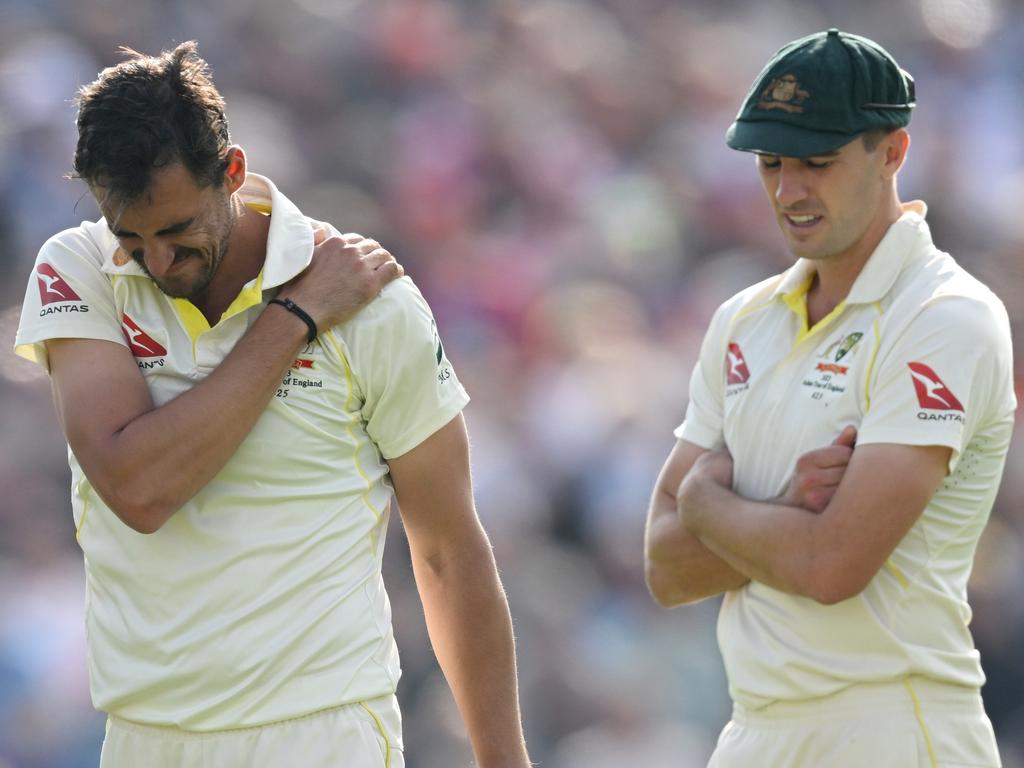Praying for rain the only sane response in this deliciously insane Ashes

Eighteen years ago it was England desperate for the elements to help preserve their two to one lead; now it is Australia who at Old Trafford need assistance towards the draw that would secure the Ashes for another 2½ years at least.
Australia’s scoreline advantage hardly seems much consolation in this increasingly one-sided Test, like an encouragement to Russian troops in Ukraine that, y’know, they won the earlier big one against the Third Reich. But it starts to matter now as, with Europe parched and alight, Manchester carries on doing its own thing meteorologically.
If the forecasts are fulfilled today, the fourth day will be the visitors’ best of the match. That’s because yesterday was, in its own way, a shambles – a more polite shambles than the second day, perhaps, but as poor as the first in Australian batters starting what they could not finish. Twelve Australian innings have made it as far as 15 in this match; none have passed 51: the batters have been hunted, hounded and harried to the brink.

Soft dismissals some, for sure. But soft dismissals often reflect earlier hardships. Take David Warner. He had escaped Broad round the wicket in the first innings only to encounter Chris Woakes over the wicket; now Woakes again beat him on the outside as he felt for the ball. Pushing out a little further to meet the next ball, Warner dragged on.
When Warner was dismissed for 4 and 1 at Headingley, one hesitated to draw conclusions: early dismissal is an occupational hazard for openers, as it was for canaries in coalmines. There is something more concerning about his falling here for 34 and 28 after finding no sort of fluency at any stage. There were no smiles, whimsical or resigned, this time: Warner departed stonily.
Steve Smith is searching. The sages are observing his technique in the micro – the constant shiftings of his guard, the subtle nuances of his trigger movements. But the story is not in the what; it is in the why. Smith’s greatly lauded “problem solving” appears to have become his problem. He is like the man trying to get to sleep by turning first one way then the other, adding then subtracting pillows, counting sheep, breaths, runs etc and in doing so keeping himself awake.
Yesterday, Smith was not even booed as he came in, which some hereabouts probably think a breach of the spirit of cricket. When the third umpire (sensibly) adjudged a low edge of his not to have carried, there was neither on-field carry-on nor crowd disturbance; there was the sense, instead, that another chance would come, as was not the case in 2019 where every missed opportunity was accompanied by a gnashing of teeth.

Perhaps it is the real and present danger of Mark Wood’s pace making that difference. He has certainly moved the dial on this series. At Edgbaston and Lord’s, Usman Khawaja’s batting had the gentle insistence of the tides; his defence was blasted open at Headingley, and his involuntary flinch yesterday resulted in the tiniest of edges.
Wood then dismissed Smith a second time in the match. Having had him looking for a short ball in the first innings, he showed his hand, and a hesitant hook was the result. Travis Head’s name, meanwhile, is becoming a case of nominative determinism; he was defending it from Wood when the ball hit his splice.
For the day’s first half, England had continued on their merry old way, even if Stokes did cost his team time indulging Jonny Bairstow’s pursuit of a thirteenth Test hundred.
To be fair, Bairstow can hardly be accused of malingering, finding boundaries even when the perimeters were patrolled by all nine fielders, batting Starc, Cummins and Hazlewood into the crowd for six. Twice, amid general hilarity, he called for byes off Cummins and Green, challenging Carey to hit the stumps underarm.

If his place has never been openly under threat, Bairstow’s mind has clearly been divided since Lord’s. He continues glancing superstitiously over his shoulder at Carey every time he leaves his crease; had he salt, he would cast it.
The Headingley Test was Bairstow’s least effectual in two years; few players on either side needed, and would have so embraced, the ensuing nine-day hiatus; he lit up on Thursday, a man refreshed, when he caught Mitchell Marsh, diving right, by far his stronger wing.
With the bat he enjoyed the freedom of mission, the clarity of the deadline and the support of the tail, which in the end was not quite enough to spirit him to a century. But as the innings ended, Bairstow hared in so swiftly to adopt his keeping gear that he only cursorily acknowledged the applause, almost passing Stokes as England’s captain hurried out to warm up. Time to get going.
Four wickets in 41 overs was good recompense for England’s efforts; a 162-run deficit for Australia is still daunting. So is praying for rain cowardly? A little. But as Yossarian observes in Catch-22, sometimes cowardice is the only sane response to an insane situation. And this series is proving deliciously insane.







‘Is it cowardly to pray for rain?’ was the title of a wonderfully droll account of the 2005 Ashes. Today, the boot is snugly on the other foot, midst a series where boots have been more or less constantly swapping.